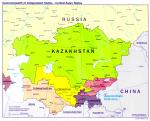
Erik Caldwell Johnson wrote a
Capacity Development Brief on the Community Empowerment Network, a community of practice for local capacity in Central Asia. The
World Bank and Europe and Central Asia Region (ECA) launched this network in 2002 as four national networks linked through regional activities that would build the capacity of communities and development partners to implement community-driven development (CDD) projects. CDD describes projects that encourage local communities to control the direction of their own development from project conception through implementation and evaluation. The Network works for Azerbaijan, Kyrgyz, Tajikistan and Uzbekistan.
Note that we get the word community at two level: community-driven development and community of practice- this is sometimes confusing in CoPs for development. And I was actually surprised because about a CoP for community-driven development, as it seems a common development paradigm in the south since the 80s already, maybe not so in Central Asia?
The modalities used are for national-regional interaction: a local NGO from each country manages each national network by facilitating annual action plans, managing funds, reporting, chairing meetings, etc. A steering group, a multistakeholder group designs and approved the action plan and budget at country level. In the first year, national partners undertook a mapping exercise to identify all international and national groups working on CDD activities. To complement the national capacity development with regional networking the World Bank brough national networks together by means of monthly videoconferences, annual conferences, regional websites and e-newsletters.
Under principles it is important to note that apart from the 'regular' principles like multistakeholder participation and partnership there is the principle of informal structure. It means there are no membership criteria, no special bank accounts, nor by-laws for its operation.
(this is different from IICD's experiences where the fact that a network is established which will handle funds, in most countries leads to legal requirements to register the network and draft by-laws etc.)
After 18 months, external consultants performed an evaluation: Community-to-community knowledge sharing, public awareness building, local partnership and CDD institutional capacity building had worked well. Moderately well worked the government involvement, regional exchanges and linkages to the World Bank operations.
Face-to-face interaction was most successful in facilitating interactions at a national level, the videoconferencing inspired less exchange and the e-mail list saw only modest use.
Activities that did not work well were the donor coordination, measurement of progress and regular interaction amongst practitioners: most international agencies were not as involved in the network activities as the local community members. (= local NGOs?)
The lessons they want to share are:
* Peer review among countries has great value
* Focus on national or community organisations as international agencies are too busy
* Establish clear indicators of progress (World Bank toolkit offers some ingredients of success as a starting point)
* Promote flexibility in contracts or agreements
* Take a long-term approach to evaluate 'social capital' - impact cannot be measured by the number of people who participate
* Strike a balance between community of practice priority setting and World Bank country strategy (too much involvement of World Bank staff is essential- too much may diminish ownership by community members
Comparing this to my personal experiences in Ghana, I can relate to the flexibility in contract- supporting a network in ICT4D in Ghana, we have just created a 'responsive' budget line with non-earmarked funds so that GINKS can be more flexible in organising activities in reaction to what emerges spontaneously amongst the members or in reaction to policy developments. The last point of striking a balance between the community of practice priority setting and the donor's is very important too- but easier said than done. My yardstick is whether my input is energizing or de-energizing the network- and I'm trying to measure this informally. Something else I try to do is purposely create various options while advising - not just one, which gives room to see in which direction people choose. The lesson to focus on national organisations as international are busy puzzles me- it could be interesting to draw in the international organisations as they may bring a new (fresh?) perspective.

 As part of the tech forum- a meeting to bring some technical ICT4 development practitioners together to talk about their practice- we watched the eclipse in Ghana. It was amazing to see how cold it became and how weird the light was. More reflections about the forum later- but the biggest hits were the tech stories and the tech demos.
As part of the tech forum- a meeting to bring some technical ICT4 development practitioners together to talk about their practice- we watched the eclipse in Ghana. It was amazing to see how cold it became and how weird the light was. More reflections about the forum later- but the biggest hits were the tech stories and the tech demos.













